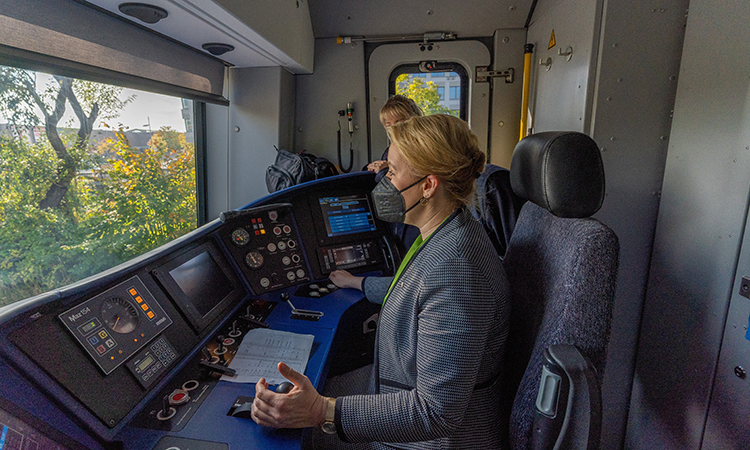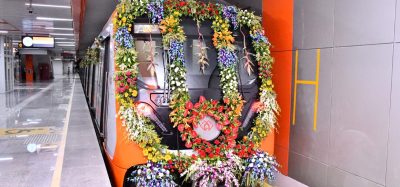New S-Bahn offers more space for passengers on line S8 in Berlin
Posted: 17 October 2022 | Elliot Robinson (Editorial Assistant - Global Railway Review) | No comments yet
60,000 passengers are to benefit from the new S-Bahn which offers more space, greater comfort, and more security cameras.


Governing Mayor of Berlin Franziska Giffey in the new Berlin S-Bahn. - Credit: Siemens Mobility
DB are completely converting the S8 line to its newest generation of S-Bahn trains. Around 60,000 passengers using the S8 will benefit from better information, more security cameras, and additional space for wheelchair users, strollers, and bicycles. Rather than operating with four cars, the new S-Bahn trains will have six. The modern trains with their distinctive flat front are already reliably operating on three of Berlin’s S-Bahn lines. As part of these upgrades, the S8 line has been extended from Birkenwerder to Wildau via Zeuthen during peak traffic periods. Together with the S46, the two lines now ensure environmentally friendly connections to the nearby Studentenstadt.
“The new trains are an excellent and attractive advertisement for switching from private to public transport,” Franziska Giffey, Mayor of Berlin, said. “This marks a further important step for ensuring more climate protection, modern urban mobility, and public participation. Future-proof, inexpensive and comfortable public transport will help us achieve our common goal: a sustainable and resource-conserving city. With DB, Stadler and Siemens, Berlin has three business partners to further drive this development.”
“Our state funds are money well invested here: passengers can look forward to more space, modern comfort, and even better service,” Rainer Genilke, State Secretary for Infrastructure and Urban Planning for the State of Brandenburg, said. “Moreover, the S8 line now connects the business and science centre Wildau with Berlin. That’s very good news for Brandenburg. We’re also taking another step toward achieving the mobility transition: With attractive offers, even more people will switch from private to climate-friendly public transport.”
“When all the new trains are in service next year, more than half a million passengers in Berlin will enjoy the benefits each day,” Peter Buchner, CEO of S-Bahn, said. “Right now, the S8 line already offers more space for passengers because we’re now running longer trains. Specifically, this means space for 300 additional passengers per train.”
Related news you will enjoy:
ÖBB and Siemens Mobility unveil interior design of new Nightjet
Alpha Trains order 15 Siemens Mobility Vectron MS locomotives
Nine new trains are in service on the 59km long S8 line, replacing the old 485 series trains. The retired trains, which are around 30 years old and date back to the days of the GDR, have been parked and will be gradually disposed of in an environmentally friendly manner. Some of the trains will be used for spare parts to maintain the remaining trains of this series that are still in service. A total of 172 cars from the new series, developed and built by the manufacturers Stadler Germany and Siemens Mobility, are currently in daily service.
“With their inauguration on the S8 line, service with the new and modern trains began on the third S-Bahn line ahead of schedule,” Jure Mikolčić, CEO of Stadler Germany, said. “The manufacturing consortium Stadler and Siemens reliably delivers one to two trains every week from the Stadler plant in Pankow to S-Bahn Berlin, where they are proving just as reliable in service. As planned, the delivery intervals are being stepped up so all 106 new trains will be available for the S-Bahn Berlin right on schedule.”
“With the punctual introduction of the new S-Bahn trains on the S8 line, the Berlin public can look forward to more seats, an improved ride experience, and greater comfort,” Albrecht Neumann, CEO of Rolling Stock at Siemens Mobility, said. “The trains of the new 483/484 series, manufactured by Siemens and Stadler, are not only impressively reliable, but also feature state-of-the-art, energy-efficient drive technology.”
The states of Berlin and Brandenburg have ordered and financed the expansion of S-Bahn services and an increase in the system’s capacity. The new trains are part of the transport contract for the Ring sub-network that took effect on 1 January 2021. The first train entered service on New Year’s Eve 2020/21, initially on the S47 line (Spindlersfeld – Hermannstraße) and, since the end of June, on the S46 line (Königs Wusterhausen – Westend). Since serial production of the trains is well under way, the S45 line (BER – Südkreuz) can even be temporarily supplied with new trains. In coordination with VBB, previously delivered trains are running on the S45 line before their planned use on other lines.
After all the trains ordered from Siemens and Stadler have been delivered at the end of 2023, a total of 106 two-car trains will be in service throughout Berlin. With these new trains, DB is increasing the capacity of the Berlin S-Bahn by 25,000 seats and making environmentally friendly public transport in the capital even more attractive for travellers. The next milestone for the S-Bahn will be the commissioning of trains for the S41 and S42 Ring lines beginning in December.
Related topics
High-Speed Rail, Operational Performance, Passenger Experience/Satisfaction, Rolling Stock Orders/Developments, Route Development, Sustainability/Decarbonisation
Related organisations
Related regions
Related people
Albrecht Neumann, Franziska Giffey, Jure Mikolčić, Peter Buchner, Rainer Genilke








